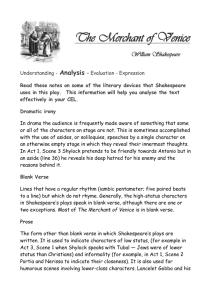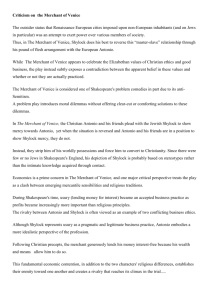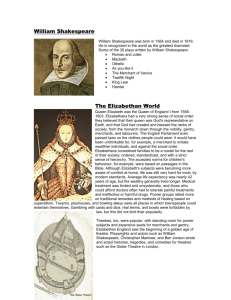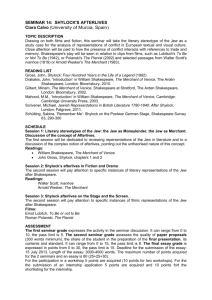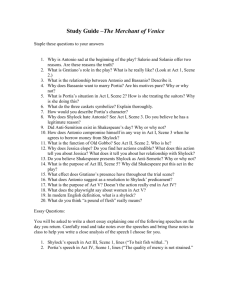Document 10464460
advertisement
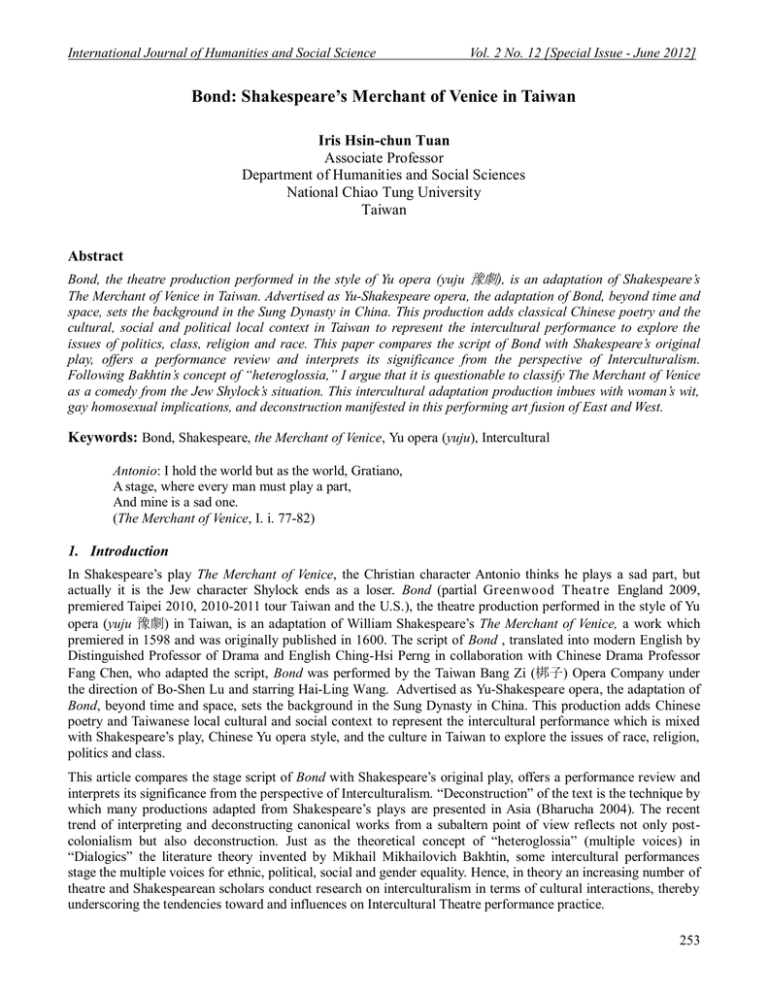
International Journal of Humanities and Social Science Vol. 2 No. 12 [Special Issue - June 2012] Bond: Shakespeare’s Merchant of Venice in Taiwan Iris Hsin-chun Tuan Associate Professor Department of Humanities and Social Sciences National Chiao Tung University Taiwan Abstract Bond, the theatre production performed in the style of Yu opera (yuju 豫劇), is an adaptation of Shakespeare’s The Merchant of Venice in Taiwan. Advertised as Yu-Shakespeare opera, the adaptation of Bond, beyond time and space, sets the background in the Sung Dynasty in China. This production adds classical Chinese poetry and the cultural, social and political local context in Taiwan to represent the intercultural performance to explore the issues of politics, class, religion and race. This paper compares the script of Bond with Shakespeare’s original play, offers a performance review and interprets its significance from the perspective of Interculturalism. Following Bakhtin’s concept of “heteroglossia,” I argue that it is questionable to classify The Merchant of Venice as a comedy from the Jew Shylock’s situation. This intercultural adaptation production imbues with woman’s wit, gay homosexual implications, and deconstruction manifested in this performing art fusion of East and West. Keywords: Bond, Shakespeare, the Merchant of Venice, Yu opera (yuju), Intercultural Antonio: I hold the world but as the world, Gratiano, A stage, where every man must play a part, And mine is a sad one. (The Merchant of Venice, I. i. 77-82) 1. Introduction In Shakespeare‟s play The Merchant of Venice, the Christian character Antonio thinks he plays a sad part, but actually it is the Jew character Shylock ends as a loser. Bond (partial Greenwood Theatre England 2009, premiered Taipei 2010, 2010-2011 tour Taiwan and the U.S.), the theatre production performed in the style of Yu opera (yuju 豫劇) in Taiwan, is an adaptation of William Shakespeare‟s The Merchant of Venice, a work which premiered in 1598 and was originally published in 1600. The script of Bond , translated into modern English by Distinguished Professor of Drama and English Ching-Hsi Perng in collaboration with Chinese Drama Professor Fang Chen, who adapted the script, Bond was performed by the Taiwan Bang Zi (梆子) Opera Company under the direction of Bo-Shen Lu and starring Hai-Ling Wang. Advertised as Yu-Shakespeare opera, the adaptation of Bond, beyond time and space, sets the background in the Sung Dynasty in China. This production adds Chinese poetry and Taiwanese local cultural and social context to represent the intercultural performance which is mixed with Shakespeare‟s play, Chinese Yu opera style, and the culture in Taiwan to explore the issues of race, religion, politics and class. This article compares the stage script of Bond with Shakespeare‟s original play, offers a performance review and interprets its significance from the perspective of Interculturalism. “Deconstruction” of the text is the technique by which many productions adapted from Shakespeare‟s plays are presented in Asia (Bharucha 2004). The recent trend of interpreting and deconstructing canonical works from a subaltern point of view reflects not only postcolonialism but also deconstruction. Just as the theoretical concept of “heteroglossia” (multiple voices) in “Dialogics” the literature theory invented by Mikhail Mikhailovich Bakhtin, some intercultural performances stage the multiple voices for ethnic, political, social and gender equality. Hence, in theory an increasing number of theatre and Shakespearean scholars conduct research on interculturalism in terms of cultural interactions, thereby underscoring the tendencies toward and influences on Intercultural Theatre performance practice. 253 The Special Issue on Humanities and Behavioral Science © Centre for Promoting Ideas, USA In my opinion, without standing in Shylock‟s shoes, it is questionable to classify The Merchant of Venice as a comedy merely from the stance of the three main characters: Antonio, Bassanio and Portia. First, the protagonist Antonio, with the help of the intelligent Portia, is eventually exempted from death; second, his friend Bassanio marries the rich beauty Portia through Antonio‟s monetary support; and finally, how the brilliant Portia tests and mocks her newly-wed husband‟s faithfulness is demonstrated at the end of the play. However, this is definitely a tragedy if the drama is seen from a marginalized point of view, i.e., not merely from the sad role which Antonio mocks himself to be on the world‟s stage but also from the circumstances of the Jew Shylock, who has been distained and despised by Christians like Antonio and others, wishing to take revenge by making a contract but losing everything in the end.i Bond poses several challenges between East and West with regard to differing languages, ideas, and customs. In terms of script adaptation, Prof. Chen believed that the greatest difficulty in adapting Shakespeare‟s play into Yu opera was the linguistic metamorphosis (Chen 2010). During the language modification process, Perng and Chen first had to translate the antiquated 400-year-old Shakespearean English into modern English, followed by further adaptation to create a Chinese translation containing a lot of rhymed poetry, as well as local Taiwanese cultural flavor such as descriptions of food, to achieve a Yu opera script suitable for singing and dramatizing. The Taiwan Bang Zi Opera Company‟s Bond (Yue/Shu 約/束) transforms the Jew Shylock into a suppressed and pitiful character. The Bond adaptation indeed constitutes a deconstruction of the Shakespearean text. The portrayal of the male character Shylock by Madame Hai-ling Wang not only deconstructs the antagonist in Shakespeare‟s original play but also arouses the audience‟ sympathy for the outsider Shylock, who came to China on business but subsequently suffers from religious and racial discrimination. In the performance, the boundary between traditional Chinese xiqu (戲曲) role types is also broken. By employing monologues typical of Western theatre to express the characters‟ interior thoughts, Bond also contributes to gender performativity. To discuss their adaptation of the script, it is necessary to understand Perng and Chen‟s reasons for choosing and abridging Shakespeare‟s The Merchant of Venice for Yu opera (yuju) as an art form (to last approximately three hours in performance). Many scenes in the original play, including those portraying the main characters Antonio, Portia and Shylock, were cut or downplayed in Bond. Thus replaced, the focus is shifted to spotlight the original marginal character Shylock, portrayed by Madame Wang, who wins the audience‟s heart as she sings an aria about the character‟s agony. Due to the deletion of the subplot wherein Shylock‟s daughter Jessica steals his valuables to elope with Antonio‟s friend Lorenzo, the conflicts and hatred between the Jewish money-lender Shylock toward the Christian merchant Antonio is weakened. ii Influenced by Queer studies, the Bond adaptation, infused with current social and political events, as well as being fused with Western dramatic and Eastern theatrical stylization, serves as an example of intercultural performance. Chen and Perng‟s adaptation centers on the “bond” (Perng 2011: 224). They believe that intercultural adaptation should not merely use the Bible as the framework of the original play. Yet the task of overcoming the limitations of Chinese opera is Chen‟s challenge in removing the traditional bond to create her script adaptation. In 1913, Shakespeare‟s The Merchant of Venice was performed in China, being the first Shakespearean performance there. The history of adaptations of The Merchant of Venice to Chinese opera began in 1952 with a work entitled A Pound of Flesh. Moreover, other well-known adaptations include Love’s Strange Bond (1989, Hefei Theatre, starring Guo-Ying Zhang and Hu Yong Jun), and the opera Wealthy Daughter. When Chen adapted Bond, she considered the previous operatic adaptations to be “simplified characters” in psychology and personality, emphasizing the lines, highlighting the drama and the performing arts” (Chen 2011: 6). Therefore, Bond contains arias sung by the main characters (Shylock, Portia and Antonio) expressing their inner thoughts derived from Shakespeare‟s complex characterization. In Bond the “hard to constrain” principle is used as the main feature of adaptation, whereby several of Shakespeare‟s long lines are shortened for retailoring into a Yu opera style with Chinese rhymed poetry and colloquial Taiwanese language. In the writing style, this adaptation also has several constraints in addition to those posed by Shakespeare‟s mostly "iambic pentameter" English poetic conventions, particularly in the plot of The Merchant of Venice. The constraints are threefold: First, Portia‟s father left her three boxes for pursuers wishing to be her prospective husband. Second, the Jew Shylock and Antonio, the Christian merchant of Venice, have a “pound of flesh” contract. Third, Bassanio and Portia's wedding ring is a token of love as a binding of vows. 254 International Journal of Humanities and Social Science Vol. 2 No. 12 [Special Issue - June 2012] Paradoxically, in Bond, these three constraints are not binding. In the plot, Portia gives Bassanio very obvious hints for choosing the right box; Shylock has a “pound of flesh” contract with Antonio, yet without considering the taking of a drop of blood; the wedding ring token of promise is sent to others; and all of the aforementioned bonds end in a void, just as Shylock‟s property is forfeited and Bassanio is forced to give up his close relationship with Antonio. Thus, Bond, advertised as Yu Shake-xigu (豫 莎戲曲), constitutes a deconstruction of Shakespeare‟s original play. 2. Intercultural Performance After comparing intercultural and multicultural theatres, Patrice Pavis categorizes performance practices into six types. When defining “intercultural performance,” Pavis states, “In the strictest sense, this creates hybrid forms drawing upon a more or less conscious and voluntary mixing of performance traditions traceable to distinct cultural areas” (Pavis 1996:8). Thus, according to this definition, “intercultural performance” connotes a combination of sources from the performance conventions of different cultures which is mixed and created purposely so as to render the original form unrecognizable. In contradistinction to Bharucha‟s claim concerning the destruction or deconstruction of Shakespeare‟s source culture, Chen describes her adaptation strategy as “conforming to the essence of the original plot” (2010:3). In terms of “intercultural performance,” Bond transforms the Western Shakespearean canon into an Eastern theatre-style Yu opera performance, exhibiting a moderate form of cultural hybridity. Hai-ling Wang, who plays the role of Shylock, breaks through the limitation of traditional Chinese operatic role types. Wang employs the dan (旦, female) voice for the hoarse glottal kuen sheng (坤生, actress playing the male role) voice, along with the chou (丑, clown) voice, characterized by hilariously funny accents and actions, sometimes also assuming the role of the jing (淨, stout and often tempestuous male) plus a little lao sheng (老生, old male) singing to express pain. In addition to the merging of Yu opera with Shakespearean drama, Bond incorporates intercultural practices in casting and musical arrangements. Therefore, aside from Shakespeare‟s original play, in consideration of the staged performance with regard to aspects such as orchestration, tones and costumes from traditional Chinese (Peking) opera, the hybridity of this adapted script can be regarded as a traditional Yu opera with ambitious innovations. Concerning intercultural performance, in accordance with Dennis Kennedy‟s suggestion that today is an era of “cultural travelling,” the problem is not to care about faithfulness to Shakespeare‟s original plays, but to scrutinize the “self-reflexive and self-conscious” meanings in such intercultural adaptations (Kennedy 2009). Thus, The Merchant of Venice, adapted as Bond and performed as Yu opera, is set in ancient far- eastern China.iii As such, Bond pioneers in the implementation of different ideas and creativity so that Shakespearean plays as foreignsource culture are more easily worked into the Taiwanese target culture, being presented as a form of crosscultural work that is closer to the local self-consciousness, not merely a superficial reproduction. Bond, as an intercultural Shakespearean adaptation, also deals with The Other in its descriptions of conflicts in religion, race, close male friendships and heterosexual marital bonds. The text, adapted from beautiful poetry and enhanced by melodious music, is very attractive but is measured with the addition of the Yu operatic style of singing. The script omits considerable portions of the subplot and significantly modifies what remains. It changes (or diverges) from Shakespeare‟s theme of racial discrimination to become Wang‟s leading portrayal of Shylock as a greedy money-lender. The Merchant of Venice consists of four episodes: “Bond,” “Caskets,” “Rings” and “Elopement” (Chang 2004: 108). As the core, the “Bond” episode describes the merchant Antonio‟s confrontation with the Jew Shylock; whereas, Bond connotes keeping a promise to not only repay a loan but also maintain fidelity in marriage. According to Perng, “(t)he play reminds us that a bond is both insurance and risk, both protection and bondage”(2011: 224). Bond is also adapted to give the characters Chinese names such as Ba (Bassanio), Mu Rongtian (Portia), Master An (Antonio), etc. Unfortunately, Bond deletes the two subplots: one in which Shylock‟s only daughter Jessica elopes with the Christian Lorenzo, also Antonio‟s friend, resulting in Shylock‟s heartbreaking loss; the other, in which the clown Lancelot Gobbo leaves his Jewish master Shylock to serve the Christian Bassanio. Omission of the two subplots thus diminishes the conflict between the Christians and the Jews. 255 The Special Issue on Humanities and Behavioral Science © Centre for Promoting Ideas, USA 3. Homosexual Implications The Bond adaptation retains the implication of homosexuality between the male characters in Shakespeare‟s play The Merchant of Venice (O'Rourke 2003). At the beginning of the play, Shakespeare points out the ambiguous relationship between Antonio and Bassanio when Antonio speaks of his “personal” devotion to Bassanio (I. i. 138). When Nerissa asks Gratiano about the lost ring, Gratiano‟s excuse indicates that the ring was given to a “boy” (V.i. 161-162). Shakespeare‟s text concurrently satirizes both homophobia and constraints against homosexuals. Therefore, as Antonio exhibits the stereotypical attitude of orthodox Christians toward Jews, the predominantly Christian audience is also forced to choose between Antonio‟s homosexual orientation, which is against Christian belief, and the sly Jewish usurer Shylock (Turner 2006: 418). Because Christian tenets prohibit homosexuality, Antonio is constrained to keep his feelings toward Bassanio as an unspeakable secret. In performance, Bond vividly represents Shakespeare‟s ambiguous between-the-lines meanings through the actress Hai-Shan Chu, who plays the role of melancholy Antonio, at the end singing an aria to express his inward grief and groan after seeing Portia and Bassanio leave. This unspeakable homosexual complex is a taboo in the Christian world. In China, “cut-sleeve” homosexuality also keeps a low profile. By putting the Dashiren (大食人, Saracen) setting in the North-Sung Dynasty (960-1126 CE), Bond intentionally blurs the time period. iv Bond is developed in two parallel lines—the loan contract and the wedding ring—to pinpoint the two issues of xenophobia and homophobia as the focus of the script adaptation and staging for the sake of the minority outsider seeking racial equality and homoerotics in queer-studies discourse. Differing from Shakespeare's The Merchant of Venice, the Taiwan Bang Zi Opera Company‟s production portrays Shylock in a role that the audience can understand and even empathize with. In Shakespeare‟s play, Shylock is an outsider, the abject Other, who lives in Venice, which was filled with racial discrimination against Jews. Shylock earns his living as a usurer, being one of the few occupations allowed for Jews. In Bond, the Saracen Shylock is also an outsider who is marginalized and mocked by the majority Han Chinese. In Scene 5, “The Debate and the Sentence,” at the turning point in the climax, Shylock changes from being confident of winning to the fate of losing. Faced with such a dramatic change and tremendous fiasco, Bond script adaptors Perng and Chen purposely added lengthy lyrics to expose Shylock’s inner thoughts by having Wang sing an aria expressing his agony and trauma. Several centuries ago, whether for Elizabethan performances of Shakespeare‟s plays or traditional Chinese Peking xiqu operas, the roles—even female ones— were mainly played by men. It is really a breakthrough that the Taiwan Bang Zi Opera Company asked Madame Wang, who used to play dan (good female) roles, to portray Xia Luo (the negative male role of Shylock) in Bond.v Bond‟s arrangement breaks through the limitations of traditional Chinese role types and cross-gender casting by having the actress Wang play the lead role of Shylock and Yang-ling Xiao play the female role of Portia as well as making up to masquerade as the young man Law Doctor to render different role images. It is not easy to express the complexity of characterizations in Shakespeare‟s plays by the set role types (sheng, dan, jing, mo, chou 生旦淨末丑) in traditional Chinese opera. Hence, Bond allows Hai-ling Wang, who portrays the character of Shylock, to combine not only sheng and jing, but also the old man (老生) role and chou, the clown (丑角), to escape from the constraint of the traditional role types. vi Differing from The Merchant of Venice, in which Antonio, Portia and Bassario are the main characters, Bond contrastingly emphasizes Shylock. As performed by Wang, the national treasure of Yu opera, the Dashiren Shylock is impressive not only for her eyecatching costumes, high-heeled shoes from Peking opera, greenish eye-shadow, and playing with a big abacus, but also for her delicate depiction of the evil but pitiable Shylock, thereby mingling different archetypical roles. Hai-ling Wang‟s performance is mixed with hilarious actions, exaggerated facial expressions and movements to deliver the lines fluidly, thereby enabling the character Shylock in her new interpretation come to life and surprise the audience. Richly endowed with a series of metaphors, the adaptation of these lines not only places local Taiwanese dishes such as stinky tofu and roasted pig into the dramatic performing language but also transforms the elegant but abstruse iambic pentameter of Shakespearean language into the local language—both literal and metaphorical. 256 International Journal of Humanities and Social Science Vol. 2 No. 12 [Special Issue - June 2012] Concurrently, as Shylock‟s arias explain the reasons for old unresolved grudges, Wang‟s vivid performance encourages the audience to understand the character‟s motivation for revenge and even feel empathy. Therefore, the audience can further perceive from the perspective of the outsider as expressed by Shylock and experience genuine compassion for this “villain.” Thus, Bond, this localized adaptation with Chinese poetic language and staging by traditional Yu opera, not only divests the plot of temporal and spatial confusion due to conflicts between East and West but also more closely approaches the lives of the contemporary audience. 4. Intercultural Adaptation Bond presents the famous Shakespearean comedy The Merchant of Venice in the medium of traditional Yu opera, thereby transforming this adaptation into an intercultural work which transgresses the traditional Chinese dramatic types and imbues Shakespeare‟s drama with the particular local Taiwanese culture. Due to various predicaments posed by linguistic transformation, many words and metaphors in the original play are adapted by Chen by using rhyming or punning mechanisms.vii Indeed, as Perng and Chen have adapted it, Bond is an intercultural presentation which features a faithful-aspossible plot as well as deconstruction from a thematic angle. The script uses lyrics in Chinese operatic and local language that transcend a literal translation. On stage, the portrayals across role types break through the fixed rules of traditional Yu opera. As for the music, performance by a folk band enables monotonous traditional Chinese operatic orchestration to become more lyrical, as in Western musicals. The costumes are based on Eastern styles, being matched with bright, vivid colors and foreign fashions. The stage design follows the minimal style of traditional Chinese opera, with proper soft long clothing and green bamboo as the background setting. Bond also provides enhanced visual effects and greater momentum for the audience in the choreographical circling by the supporting actors and chorus. Similar to the post-colonial “hybrid” concept proffered by Homi Bhabha and the postmodern ideas of culture in simulation and simulacrum presented by Jean Baudrillard, Bond portrays cultural hybridity in interactions between the Eastern and Western cultural elements. In performance, Bond attempts to cross cultures but not without bonds, e.g., racial issues erased because of political concerns as well as traditional thinking with regard to “roles” not yet fully overcome. These bonds render this intercultural adaptation incomplete. Aside from departures from the Western canonical script, the performance is based on Yu opera, incorporating several innovative spotlights on the monologues and arias of certain characters. The adaptation also blends Chinese poetic literature as well as Mandarin and popular Taiwanese slang into the text. One of Murong Tiam (Portia)‟s suitors, performing grotesquely and speaking simple Japanese while wearing an ancient Japanese-style costume, embellishes this piece within an intercultural milieu. 5. Conclusion Bond represents a unique fusion between the East and the West, an integration of the traditional and the modern. In integrating cultures, it exhibits a cultural interweaving of Shakespeare‟s English drama with Chinese Peking opera stylization, a few elements from both Western-style Italian opera and American musicals, as well as a Japanese samurai, plus generous portions of Taiwanese culture and delicious food. By the medium of Yu opera, Bond borrows from the Shakespearean canon, rewords the text operatically, and embodies Shylock as the Other in a new image. Bond also provides a contemporary intercultural angle for reinterpreting the marginal character Shylock, thereby renovating Shakespeare‟s play via Henan Bang Zi adaptation. With regard to genre, this adaptation, unlike Shakespeare‟s Merchant of Venice, should not be categorized as “comedy.” From Shylock‟s perspective, Bond is a blend of tragicomedy and farce rather than either genre alone. Perhaps, as exemplified in Madame Wang‟s “role- combination” performance, Bond also crosses the boundary between single genres to become “Shake-xiqu.” Due to the influence of the globalized movie industry, traditional Chinese opera is declining. Thus, adaptation of Shakespeare‟s famous plays is a common way to innovate and draw a declining audience back to the theatre. In addition to a concrete depiction of protagonists and villains that can complement the abstraction and slow the pace in traditional Chinese opera, the universality and the symbolism of Shakespearean plays subjected to globalization are ways to attract more attention toward directors who deconstruct and innovate without explaining the stories. Apart from its unique theatrical representation, the success of Bond in Shakespeare‟s hometown in England has received praise from several scholars with expertise in Shakespearean studies. 257 The Special Issue on Humanities and Behavioral Science © Centre for Promoting Ideas, USA Similar warm comments from critics and local audiences‟ applause for this intercultural performance have resulted in favorable reviews of performances on tour in the U.S. Ultimately, what do adaptations of Shakespeare‟s plays in traditional Asian theatres (such as Kathakali, Noh, Peking Opera and Yu Opera) seek to convey? Is it the theme or the language of Shakespearean drama, the nonverbal postmodern theatre, or an effort to renovate the elegant stylization of traditional Chinese opera? Whenever Asian traditional theatre companies stage Shakespeare‟s dramas, problems with the differences between Western and Asian cultures must be faced. According to Pavis‟ intercultural “filter” theory, should the ancient caste system in India as a target culture, for example, also appear in the source culture‟s adaptation into the local context? As for the Bond adaptation, should it faithfully represent the fact that the suitors in The Merchant of Venice who come to choose boxes because they saw Portia‟s beauty also stay at her house? According to traditional Chinese custom, this particular behavior is inappropriate. In Bond the original settings of Shakespeare‟s play are rearranged and modified. But does this revision also weaken the intention to choose a Shakespearean drama for staging? For example, this adaptation neglects an entire set of Portia‟s brilliant monologues satirizing the suitors, thereby hindering the audience from completely understanding Portia‟s intelligence in outwitting several male characters in the play. Moreover, the subplot wherein Antonio‟s friend Lorenzo cleverly carries away Shylock‟s only daughter Jessica and his property, causing extreme grief and agony for Shylock, is also deleted. The omission of this subplot in fact minimizes the reasons for the audience to sympathize with Shylock and understand his desire for revenge. The title “Bond”—a contract and a restriction—signifies to the Eastern world not merely a written testimony or document but also mutual responsibility and constraint. By an intercultural adaptation of Shakespeare‟s play, Bond sheds new light on traditional Chinese opera by exhibiting the beauty of acting and singing in traditional Yu opera. The costumes and stage designs are richly colorful. In the revised plot, complex human nature entangled with conflicts, struggles and quarrels provoked by betrayals of contracts and marriage vows contributes to a splendid performance, thus meeting the audience‟s expectations. Therefore, Bond as Yu opera is indeed an intercultural performance, an East-West hybridization of cultures. By employing a complex Shakespearean plot as the narrative framework for complementing the traditional Chinese xiqu and infusing its script with Chinese culture and literature by the theatrical stylization of Yu opera, Bond is successful with regard to an intention to expand the self-reflexivity and self-consciousness of cross-strait politics. Thus, this re-dramatization of The Merchant of Venice has not only borrowed from Shakespeare‟s canon but also caters to the taste of the audience. Figure 1. Poster advertising Bond (Photo: Courtesy of Taiwan BangZi Company). 258 International Journal of Humanities and Social Science Vol. 2 No. 12 [Special Issue - June 2012] Figure 2. Cast and stage design with Chinese poetry in Bond. (Photo: Courtesy of Taiwan Bang Zi Company) Figure 3. Madame Hai-Ling Wang portrays Xia Luo (Shylock) with a combination of role types. (Photo: Courtesy of Taiwan Bang Zi Company) Figure 4. Murong Tiam (Portia) in her gorgeous red wedding gown and golden headdress enters the stage to accept the audience’s applause with Master An (Antony) in the back. (Photo: Courtesy of Taiwan Bang Zi Company) 259 The Special Issue on Humanities and Behavioral Science © Centre for Promoting Ideas, USA Notes i At this point, the Jew Shylock, portrayed by Al Pacino in the film The Merchant of Venice (2004), directed by Michael Radford, might serve as a good reference with regard to delicate acting and humanistic interpretation. ii Two minor scenes, depicting (1) Lancelot and his father, Gobbo the clown‟ s conversation and (2) Shylock‟s Christian servant Lancelot quitting to work for Bassanio, are pruned so that Bond modifies Shakespeare‟s The Merchant of Venice, which focuses on religious and racial conflicts as well as homosexual innuendo, as emphasized in a marginal character. Perhaps there was a slight intention to use the earlier story as a metaphor of the present.Nevertheless, this adaptation borrows the commercial competition between the Han people and the Dashiren to reflect upon the complicated issues of global financial crises, bankruptcy of nations, European Union loans, as well as racial discrimination and ethnicity problems in the present world under capitalism and globalization. iii Having originated in the Henan Province of China, Yu opera was originally known as “Henan clapper,” characterized by a distinctive roar with strong emotions. iv During the North Sung Dynasty, Saracens did indeed come to Kaifeng, Henan to do business with the Cathayans. (Perng, 2011: 225). v According to Chen, “Wang‟s portrayal of Shylock is the only role of its type played by an actress in Chinese operas, being possibly unique in all performances of The Merchant of Venice worldwide. The inevitable „female voice‟ in the monologues and arias adds a special demeanor and charm to Shylock‟s persona.” (Chen 2010: 16) vi Hai-lingWang, trained as a dan, did make a breakthrough with her “female voice” in portraying Shylock, but the Clown Shylock buries Wang‟s elegant manners as a dan. vii For example, in Scene Three, “Bonding of Love,” Murong Tian (Portia) hints the correct choice to Ba (Bassanio) by giving him her poem in which「箋」and「牽」rhyme, being pronounced as 鉛(17). The English translation also preserves the “ed” rhyme in “lead.” In Scene Seven, “The Bargain,” Chen also adds the sexual implication concerning the ring (Perng and Chen, 2009:54). References Baudrillard, Jean. “Simulation.” Ed. Richard Schechner. Performance Studies. London: Routledge, pp. 117-123. Bharucha, Rustom. “Foreign Asia/Foreign Shakespeare: Dissenting Notes on New Asian Interculturality, Postcoloniality, and Recolonization.” Theatre Journal. 56. 1. The John Hopkins University Press (2004):128. Kennedy, Dennis. “Shakespeare, Asia and Interculture.” Taipei: The Fourth Conference of the NTU Shakespeare Forum: Shakespeare in Culture, 2009. O'Rourke, James L. “Racism and Homophobia in The Merchant of Venice,” ELH 70.2. (Summer 2003): 375-397. Pavis, Patrice. Ed. The Intercultural Performance Reader. London: Routledge, 1996. Perng, Ching-Hsi and Fang Chen. Yue/Shu (約/束). Taipei: Student Book, 2009. Perng, Ching-Hsi. Trans. Bond. Translated from Ching-Hsi and Fang Chen. Yue/Shu (約/束). Taipei: Student Book, 2009, a. Perng, Ching-Hsi. “A Bangzi Merchant of Venice in Taipei: Yue/Shu (Bond).” Asian Theatre Journal. 28.1 (Spring 2011): 222-233, b. Turner, Henry S. “The Problem of the More-than-One: Friendship, Calculation, and Political Association in The Merchant of Venice.” Shakespeare Quarterly 57.4. (Winter 2006): 413-442. Chang, Chin-Erh張靜二. “The Plot of „Colorful Caskets‟ in The Merchant of Venice.”(《威尼斯商人》的「彩匣」情節). In Discovering Shakespeare—Shakespearean Discourse in Taiwan. (《發現莎士比亞—台灣莎學論述選集》) Taipei: Maotoyin Press, 2004. Chen, Fang 陳芳. “How Can It be Bond?—Intercultural Adaptation of Yu ShakeXiqu.”〈豈能約束?──「豫莎劇」《約/束》的跨文化改編〉). In Taipei Theatre Journal. (《戲劇學刊》) 14 (2011). Radford, Michael. Dir. The Merchant of Venice. Perf. Al Pacino, Allan Corduner, Jeremy Irons, etc. 2004. Film. Yue/Shu (約/束). Taiwan BangZi Yu Opera. Nov., 29, 2009. DVD Recording. 260
